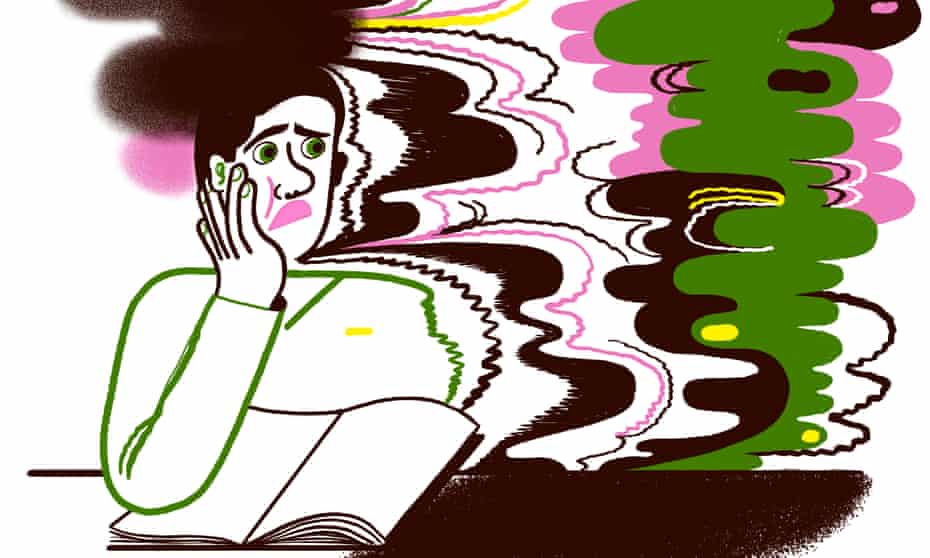In recent weeks, Dr. Kali Cyrus has struggled with periods of exhaustion.
"I am taking a nap in between patients," says Cyrus, a psychiatrist at Johns Hopkins University. "I'm going to bed earlier. It's hard to even just get out of bed. I don't feel like being active again."
Exhaustion is also one of the top complaints she hears from her patients these days. They say things like, "It's just so hard to get out of bed" or "I've been misplacing things more often," she says.
Some patients tell Cyrus they've been making mistakes at work. Some tell her they can "barely turn on the TV. 'All I want to do is stare at the ceiling.' " Others say they are more irritable.
While some people who have had COVID-19 report brain fog and fatigue as lingering symptoms of their infection — what's known as long COVID — mental health care providers around the U.S. are hearing similar complaints from people who weren't infected by the virus. And many providers, like Cyrus, are feeling it themselves.
This kind of mental fog is real and can have a few different causes. But at the root of it are the stress and trauma of the past year, say Cyrus and other mental health experts. It's a normal reaction to a very abnormal year.
And while many people will likely continue to struggle with mental health symptoms in the long run, research on past mass traumas suggests that most people will recover once the coronavirus pandemic ends.
"We know that the majority of people tend to be resilient," says Lynn Bufka, a psychologist with the American Psychological Association. "They may have struggled during the time of the challenges but generally come out OK on the other end."
In the meantime, Bufka and other experts say that there are things we can do now to fight the mental fog and exhaustion.
How stress and sleep are linked
"Exhaustion can be a symptom of many things," says Cyrus.
For one, it can be a symptom of stress.
"We know from other research that people will talk about fatigue as something that they experience when they're feeling overstressed," says Bufka.
A recent survey by the American Psychological Association found that 3 in 4 Americans said that the pandemic is a significant source of stress.
Millions of people have lost loved ones, have become ill themselves and/or have lost income as a result of the pandemic. The threat of COVID-19 alone has been stressful for most people, as has all of the upheaval that the pandemic has brought, says Bufka.
Stress "keeps our mind vigilant and our nervous system vigilant, and that uses more energy," says Elissa Epel, a psychologist at the University of California, San Francisco. That's one reason that prolonged stress can leave us feeling drained.
Another way that chronic stress makes us feel exhausted is by interfering with sleep, says Bufka. "When we're feeling stressed, our sleep can get disrupted, which naturally leads to feelings of tiredness and exhaustion," she says.
"We really rely on sleep to recover each day," explains Epel. "And so for many of us, even though we might think we're sleeping the same number of hours, it's not the same quality. It doesn't have the same restorative ability, because we're getting less deep sleep, and we think that is tied to this chronic, subtle uncertainty, stress."
Chronic stress also triggers low-grade inflammation, she adds.
"We have this inflammatory response when we're feeling severe states of stress that can last. It's subtle, it's low grade and it can absolutely cause fatigue and a worse mood."
A year of anxiety, grief and trauma
The fatigue and fog so many are feeling now also could be symptoms of other mental health issues that flared over the last year, says Dr. Jessica Gold, a psychiatrist at Washington University in St. Louis. "After this long, most people have had some degree of anxiety, depression, trauma, something," she says.
As studies have shown, rates of anxiety and depression in the population have gone up during the course of the pandemic.
Long-term anxiety can also exhaust the body, says Gold.
"We evolved as creatures, people that run from predators in the animal kingdom, right? To have anxiety as a way to predict and run from threat," she says.
When we're anxious, our hearts race and our muscles tense up as we prepare to fight a predator or run from it. But "you can only run a 100-yard dash for a short amount of time. Not a year, and not a year where they keep moving the finish line," says Gold. "We can't do that. Eventually our muscles and our body say, 'No, I'm tired.' "








